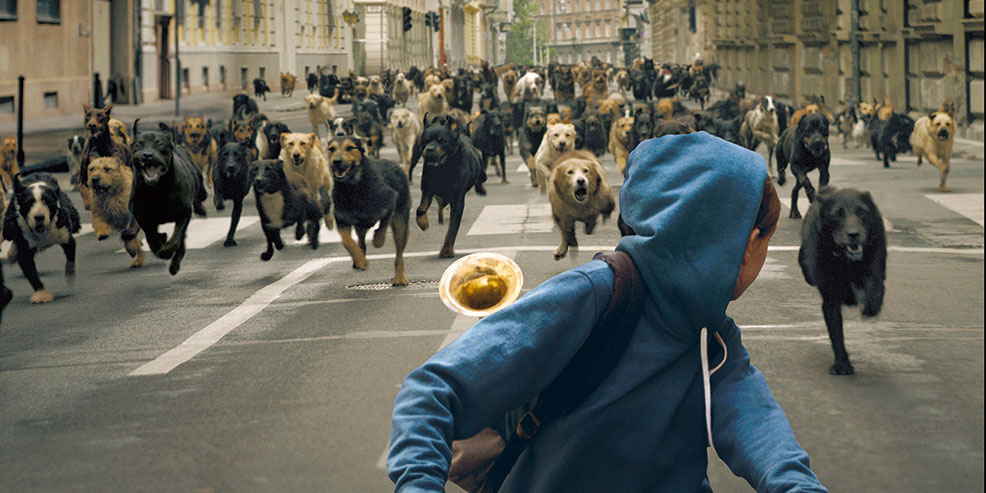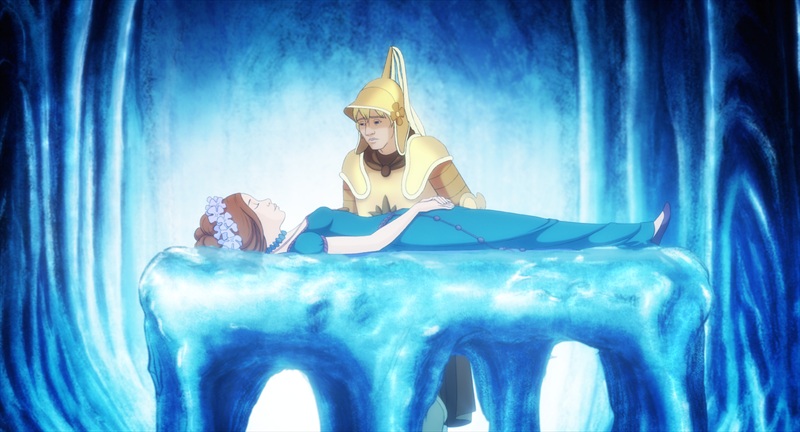In 1998,
the Gene Siskel Film Center at the Art Institute of Chicago first staged the
European Union Film Festival, a month-long program designed to highlight the
latest films to emerge from the EU member nations, both the newest works from
some of the most important names in cinema as well as the first projects from
the most talented newcomers, many of which are making their U.S. premieres. Now
in its 18th year, the festival, which this year kicks off on March 6 and runs
through April 2, will feature 61 films from 27 of the 28 EU nations (Malta
being the only no-show), making it the largest North American showcase
dedicated to their output, and cover virtually every imaginable cinematic style
and genre imaginable.
As has
been a festival tradition, the Opening Night slot has been given to a film from
the nation that is currently holding the presidency of the real EU. This year,
the honor goes to the Latvian film “The
Golden Horse,” (March 6, 8) an animated fantasy in which a sorceress
casts a spell putting a kingdom into peril and its princess into a deep sleep
atop a snowy mountain that only a stalwart hero can possibly break—it couldn’t possibly be the lowly youngest child of a
family of violent oafs, could it? Visually, the film is impressive in the way
that it evokes mid-period Disney films like “Cinderella” and
“Sleeping Beauty” in an appealingly retro manner. From a dramatic
standpoint, however, the film is less impressive with some clunky dialogue as
well as a couple of less-than-inspiring songs. To be fair, however, the version
I viewed was an English-language dub while the one screening at the festival
will be in Latvian, which I suspect will help make the storytelling go down a
little smoother.
The
Closing Night presentation is “How
Strange To Be Named Federico: Scola Narrates Fellini” (March 28, April
2), a film by Italian director Ettore Scola (“Il Sorpasso,” “A
Special Day”) that pays tribute to the man who was one of the leading
lights of his country’s cinema as well as an artistic inspiration and personal
friend. Not a strict documentary by any means—how
could it, considering the subject—Scola uses a combination of
film clips and dramatic recreations to recount Fellini’s formative years as a
writer for an Italian satire magazine and the friendship that developed between
the two when Scola joined the same magazine eight years later. Obviously, those
with a working knowledge of Fellini’s work will get more out of this than
others but anyone, regardless of their familiarity with the subject, will be
able to recognize the love for the man and his work that comes through in every
scene and the finale—which includes footage taken
from the three days that his casket was on view at Rome’s fabled Cinecitta
studio following his death in 1993 and a montage of clips from his fabled
filmography—will probably reduce most
viewers to tears.

A few of
the filmmakers are currently scheduled to be on hand to discuss their films
after the screenings. Gustav Deutsch will appear at both showings of “Shirley: Visions of Reality”
(March 27, 28), an Austrian film with a narrative loosely built around thirteen
paintings by Edward Hopper. Italian director Francesco Munzi will introduce “Black Souls” (March 14), a
drama exploring organized crime through the eyes of a family torn apart when a
young man decides to go against his own family to follow the lure of dirty
money. U.K. filmmaker Anthony Baxter will present “A Dangerous Game” (March 29), a follow-up to his 2011 documentary
“You've Been Trumped”, that finds him continuing to
protest the waste of space and resources committed by fancy golf courses and
confronts one of their most vociferous proponents—short-fingered
vulgarian Donald Trump.
A number
of this year’s selections include some familiar faces in front of the camera.
It would be almost impossible, for example, to hold a festival dedicated to
European film and not include one
starring the incomparable Isabelle Huppert and this year, that slot is filled
by “Tip Top” (March 20,
22), a weird melding of cop thriller and oddball farce in which she and
Sandrine Kiberlain play a couple of internal affair investigators looking into
the murder of an informant while dealing with their own personal kinks—Huppert has a bedroom manner that makes “Fifty Shades
of Grey” look like child’s play while Kiberlain is obsessed with
voyeurism. The film is maybe a little too deadpan for its own good but Huppert
and Kiberlain manage to make it watchable throughout. Likewise, “Gemma Bovery” (March 8, 12),
Anne Fontaine’s comedy-drama about a Flaubert fanatic who sees his new neighbor
as the reincarnation of Emma Bovary herself and fears that she is headed down
the same doomed path, is kind of a mess throughout (with an exceptionally
ridiculous ending), but Gemma Arterton is so compulsively watchable as the
title character that she keeps it on track for far longer than it might have in
the hands of another actress.

Among the
other famous faces on display, “Game of Thrones” actress Maisie
Williams stars in the Irish entry “Gold”
(March 21, 22), in which she plays a young potential track prodigy struggling
to resume a relationship with the father (David Wilmot) who has just returned
into her life after a long absence. “Set
Fire to the Stars” (March 21, 25) is a docudrama from the United
Kingdom featuring Elijah Wood as an American poetry professor who puts together
a stateside speaking tour for the infamous Dylan Thomas (Celyn Jones). Fans of
the music of the 1980s should enjoy “Soul
Boys of the Western World” (March 7), a documentary focused on the
rise, fall and reunion of the group Spandau Ballet. The strangest star vehicle
of the bunch is France’s “The
Kidnapping of Michel Houellebecq” (March 21, 23), in which the noted
and controversial actor appears as himself in a largely improvised comedy-drama
that offers his version of a period of time when he seemed to disappear for a
few days—in his take, he was kidnapped
and taken to a remote junkyard where he found himself bonding with his
surprisingly affable captors.
There are
also a number of well-known names, at least in cineaste circles, behind the
camera in this year’s lineup. For what would prove to be his final film, “Life of Riley“ (March 13,
19), French filmmaker Alain Resnais adapted Alan Ayckbourn’s stage comedy about
a fatally ill man who, despite never appearing onscreen, nevertheless manages
to mess up the lives of his friends and loved ones. The always controversial
Bruno Dumont returns with “Li’l
Quinquin” (March 7, 9), a jumbo-sized (197 minutes) and oftentimes
grim drama (albeit spiked with some moments of comedy to relieve the gloom) about
a young boy who happens to discover the first of what proves to be a series of
brutally murdered bodies. Austrian Ulrich Seidl, whose previous films have
included the art house sensations “Dog Days” and the
“Paradise” trilogy, returns with “In
the Basement” (March 7, 11), giving viewers a look at the basements of
a collection of characters and the strange and sometimes shocking secrets that
they conceal. Pedro Costa, the Portuguese director behind the acclaimed 2006
film “Colossal Youth,” returns with “Horse Money” (March 20, 23), in which he reunites with
longtime collaborator Ventura for a surreal work in which the latter, who is
dying, takes a journey through his past that eventually begins to merge with
that of his country. On a similar note, Polish director Lech Majewski
(“The Mill and the Cross“) presents “Field of Dogs” (March 15, 18), a work inspired by
“The Divine Comedy” that follows a poet grieving the shockingly
sudden death of the love of his life.

Like all
film festivals, knowing what to see and what to skip is a bit of a crapshoot—especially in the case of a lineup like this where one may
never get a chance to see many of the titles in a theater again due to the
vagaries of foreign theatrical distribution these days. I have no problem,
however, in dissuading you from the staggeringly irritating Romanian drama “Deja Vu“ (March 7, 11), a
drama in which the relationship between a rich man and his young mistress goes
to pieces over the course of a morning in which they travel to his estranged
wife to seek a divorce—to make matters more
aggravating, the entire thing is shot from the unseen man’s perspective through
director Dan Chisu playing the part with a camera mounted on his head. (If
Henry Jaglom was ever given a GoPro camera, this would be the result and now
that I think of it, he also made a movie called “Deja Vu”). The
highly hyped “White God” (March
11), a political allegory about immigration from Hungary in which a law against
mixed-breed dogs separates a girl from her pet—the latter joins up with a
growing number of dogs to revolt against mankind (needless to say, this is not
for the little ones)—is quite effective (especially
if dogs kind of terrify you in the first place). But since it will be getting an
art house release in the next few weeks, you might be better off taking a
chance on something else unless you simply want bragging rights.
If I had
to pick one title as a must-see, despite the fact that I myself have not yet
seen it, it would be Sweden’s “A
Pigeon Sat On A Branch Reflecting On Existence” (March 17) and not
just because it has the coolest title imaginable. This is the latest film from
writer-director Roy Andersson and while he does not make very many movies, his
two previous features, “Songs from the Second Floor” (2000) and
“You, The Living” (2007), have provided me with a pair of the most
extraordinary movie-going experiences of my life thanks to his jaw-dropping
brand of stone-faced surrealism, an approach so wild and bizarre that David
Lynch himself no doubt looks upon his work with equal parts confusion and
delight. According to the program, this excursion presents “37 sketches
whose material includes two forlorn novelty salesmen, a modern-day visit by an
18th-century Swedish king and a savage satire of colonialism.” I admit
that his work may not be for everybody (I vividly remember a screening of
“Songs from the Second Floor” at Ebertfest that left the audience
divided between the delighted and the dumbstruck) but if you want to see
something that you almost certainly have never seen before—or even thought could be seen before—I am betting that this is the one for you.












